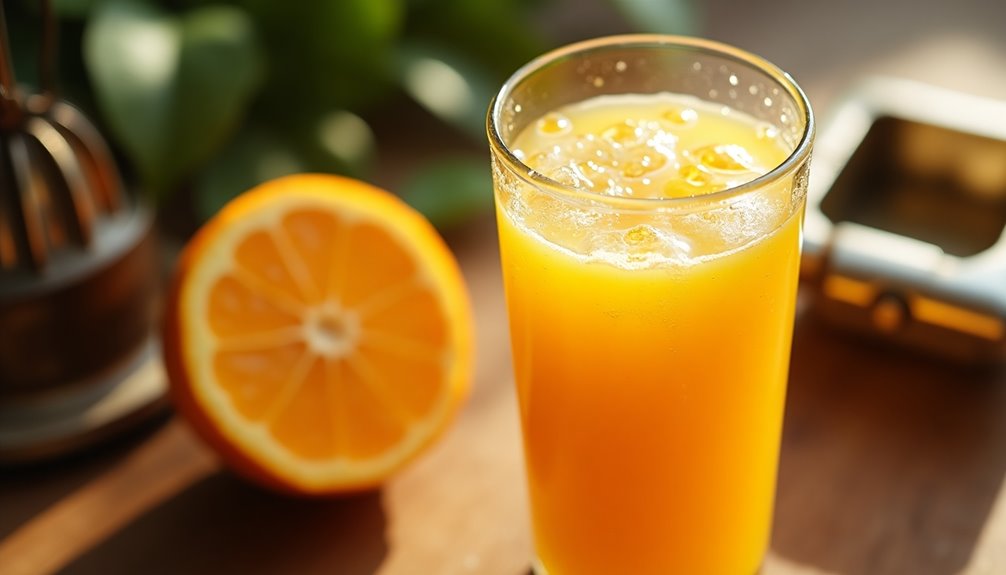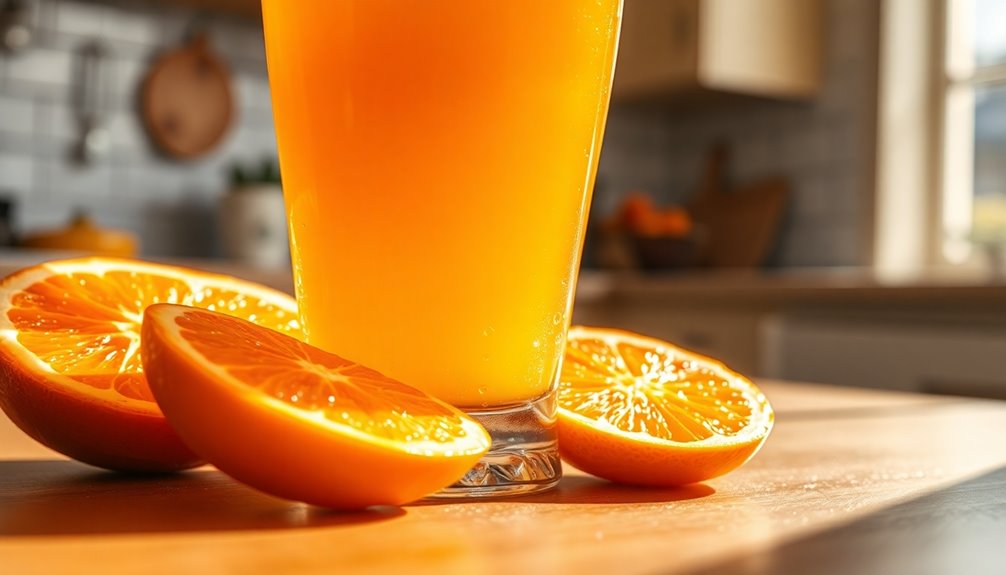Orange juice prices vary quite a bit depending on the brand and features. You can grab budget-friendly options like Great Value 100% Orange Juice for about $4.48 for 64 fl oz. If you prefer premium brands, Tropicana offers quality juice at around $3.96 for 46 fl oz. There are also organic and nutrient-fortified choices that might cost more. Want to discover more about the different varieties and their benefits?
Key Takeaways
- Budget-friendly options like Great Value 100% Orange Juice start at $4.48 for a 64 fl oz bottle.
- Premium choices like Tropicana Pure Premium 100% Orange Juice cost around $3.96 for a 46 fl oz bottle.
- Nutrient-fortified options, such as Great Value's calcium and vitamin D juice, are priced at $4.48 for 64 fl oz.
- Organic options, like Wholesome Pantry Organic No Pulp 100% Orange Juice, are available for $4.49 for 52 fl oz.
- Price varies based on brand, pulp content, and organic certification, with higher-quality products typically costing more.

Have you ever wondered how much you should expect to pay for orange juice? It's a common question, especially when you're staring at a crowded grocery aisle filled with different brands and types. The price can vary significantly based on brand, pulp content, and whether the juice is organic. Knowing your options can help you make an informed choice that fits your budget.
If you're looking for a budget-friendly option, Great Value 100% Orange Juice is a solid choice. The Pulp Free Juice Bottle (89 fl oz) is priced at about $6.64, while the same brand with pulp in a smaller 64 fl oz bottle costs $4.48. This gives you a decent amount of juice without breaking the bank.
If you prefer a more premium taste, Tropicana Pure Premium 100% Orange Juice is available in a 46 fl oz bottle for just $3.96. This makes it one of the more affordable options in the premium category. You'll find that Tropicana offers a balance of quality and price, making it a popular choice for many households.
For those who want something different, you might consider Tampico Citrus Fruit Punch. This budget-friendly orange juice alternative comes in a 1-gallon jug and is priced at just $2.78. While it's not 100% orange juice, it's a tasty option if you're looking to save some cash or simply enjoy a fruit punch flavor.
However, if you're set on pure orange juice, you'll want to stick with brands like Great Value or Tropicana.
If health is a priority for you, look at options fortified with nutrients. Great Value's 100% Orange Juice (No Pulp, Calcium & Vitamin D, 64 fl oz) also retails for $4.48, giving you the added benefit of vitamins in your morning glass. It's a great way to boost your calcium intake while enjoying a refreshing beverage.
For those who prefer organic, Wholesome Pantry Organic No Pulp 100% Orange Juice (52 fl oz) is available for $4.49. You'll pay a premium for organic certification, but many people feel it's worth it for the peace of mind that comes with organic products.
In addition to these traditional options, you might've come across Sunny D. While it's more of a juice drink than pure orange juice, it's another choice that many families enjoy for its sweet flavor and fun branding.
Frequently Asked Questions
How Much Is the Juice of an Orange?
The juice of an orange typically yields about 2 to 4 ounces, but it can go up to 6 ounces for larger fruits. In addition to being a refreshing beverage, orange juice is a great source of vitamin C and other essential nutrients. Many people also enjoy incorporating vegetable juices into their diets, with V8 juice being a popular choice for those seeking a mix of flavors and health benefits. However, it’s important to keep in mind the sodium content in V8 juice, as it can vary depending on the specific variety and brand.
If you're looking to make a glass of juice, you'll need around 4 to 6 medium-sized oranges.
Freshly squeezed juice often packs more nutrients than processed options, so squeezing your own is a great choice.
Just remember, the amount you get can vary based on the size and juiciness of the oranges!
Why Is OJ so Expensive?
You might wonder why orange juice is so expensive. Factors like climate conditions impact crop yields, causing supply fluctuations.
The production process, from harvesting to packaging, adds operational costs that reflect in the price. Additionally, the growing demand for pure orange juice, which often has fewer additives, can drive prices higher.
Don't forget transportation costs; shipping fresh oranges and juice quickly is essential for quality, which also affects overall pricing.
Which Juice Is the Cheapest?
If you're looking for the cheapest juice option, you'll want to grab Tampico Citrus Fruit Punch, priced at just $2.78 for a full gallon.
That works out to about 2.2 cents per fluid ounce, making it an excellent deal.
If you prefer orange juice, both Great Value 100% Orange Juice varieties are also affordable, costing $4.48 for 64 fluid ounces, which is 7 cents per ounce.
Choose what fits your taste and budget!
How Many Oranges Make 8 Oz Juice?
So, you think you can just waltz into juicing with one orange? Think again!
You'll need about three medium-sized oranges to squeeze out a refreshing 8-ounce glass of juice. The juiciness of those sunny fruits can vary, but navel oranges are your best bet for sweetness.
If you grab larger, riper ones, you might even get lucky and hit that 8 ounces with just two.
Happy juicing, you citrus connoisseur!
Conclusion
In the end, the price of orange juice can vary, but finding a good deal is worth the effort. Remember, "a penny saved is a penny earned." Whether you're sipping it fresh or from a carton, investing in quality juice can brighten your day. So keep an eye out for sales and discounts, and don't hesitate to stock up. After all, enjoying a refreshing glass of orange juice is a simple pleasure that shouldn't break the bank!
Cindy thoroughly researches juicing trends, techniques, and recipes to provide readers with practical advice and inspiration. Her writing style is accessible, engaging, and designed to make complex concepts easy to understand. Cindy’s dedication to promoting the advantages of juicing shines through her work, empowering readers to make positive changes in their lives through the simple act of juicing.











